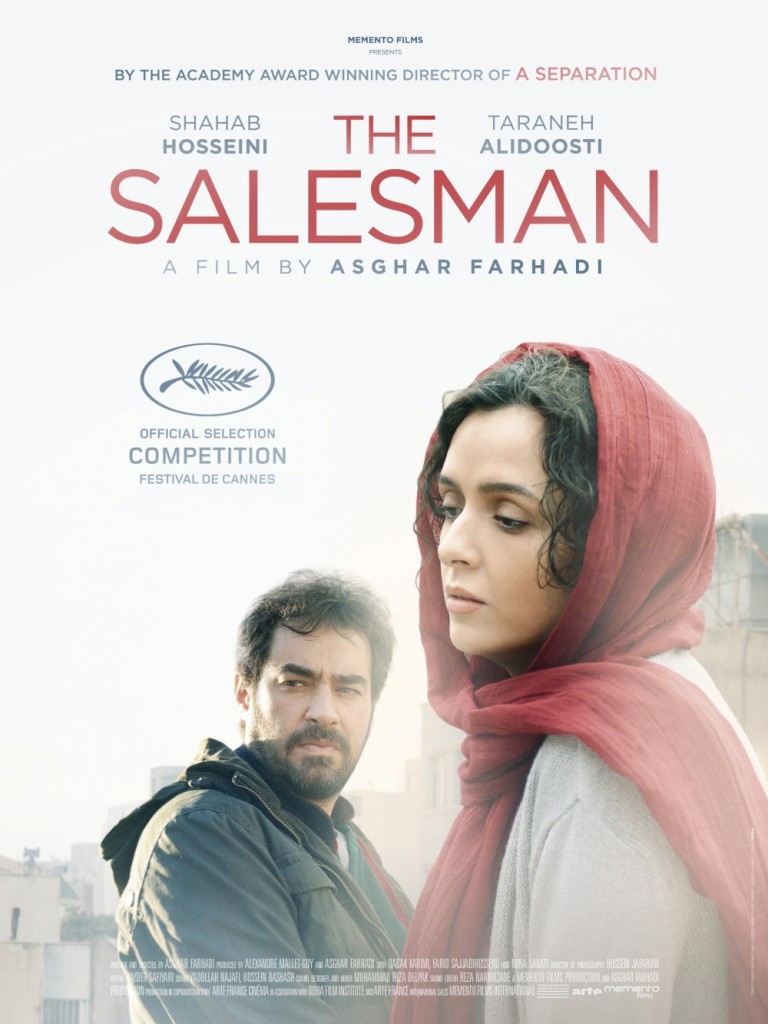Movie Breakdown: The Salesman (Noah)
Pre-Screening Ramble:
The Salesman has been drawing a lot of attention for more than a few reasons. First, it’s the new film by the director of A Separation, an Iranian film that hit hard in America three to four years ago. Second, it’s nominated for Best Foreign Film at a little award show called the Oscars. And third, director Asghar Farhadi will not be able to attend the event because of a certain Muslim ban being pushed on the world by a certain Golden Haired Cheeto currently resting his feet in the Oval Office.
Post-Screening Ramble:
The Salesman is the type of film that makes me want to know more about a country, or a history, or a person, because my failure to understand the subject as well as I should, seems to leave me less awed by the movie. Iranian director Asghar Farhadi has crafted a slow, naturalistic film about a couple – Rana and Emad Etesami (Taraneh Alidoosti and Shahab Hosseini) – who are starring in a community theater version of Arthur Miller’s Death of a Salesman. When Rana is assaulted in their home, well, things, slowly start to fall apart. The Salesman, which I believe refers to either Miller’s titular character Willie Lohman or an elderly clothe salesman who shows up late in the film, is a film about what life gives us, what we do with it, and how our reactions ripple outwards to affect others. Rana and Emad at the beginning of the film are a seemingly happy, healthy, normal couple who lose their house and have to move into a hastily evacuated apartment owned by a friend and fellow actor. Then Rana is assaulted. And this is where my lack of understanding about Iranian culture seems to ding my enjoyment of the film, Emad, against Rana’s wishes, obsesses over who might’ve broken in, who might’ve hurt his wife, and starts searching for him. It’s interesting enough, the film unfolding one scene at a time, revealing its emotional core ever so slowly, but there’s interactions between the couple and the actors on the stage that seem important but I couldn’t fully grasp because aside from scary editorials I’ve read in The New York Times, I don’t know anything about Iranian gender politics. A lot of what I think was important to the story and to the power of the film, fell flat with me, because, well, I’m a dumb American. And without that knowledge, without the cultural awareness that I think makes this film standout from other films like it, well, it doesn’t. Worse off for me is that I couldn’t fully grasp what the connection to Miller’s play was. They show whole scenes throughout the film and though they worked as markers, or chapter heads, I never saw an enormous connection between the two. But again, maybe this is because I don’t know anything about the Iranian theater scene. It’s a good take on the sort of common story of revenge gone awry, with a dash more humanity and a drop more naturalism, but still fairly commonplace in the greater scheme of things. And as well acted as this film is, it doesn’t seem like a home run if I leave the theater wondering if maybe I just didn’t have enough pre-knowledge to really grab the film’s essence. A great film is great universally, and though this is a good one, it certainly isn’t great.
One Last Thought:
I watched The Salesman right after Nerurda (my review of that bold and strange film is here). I wonder if I would have had a different experience with The Salesman had I viewed it before Nerurda?



